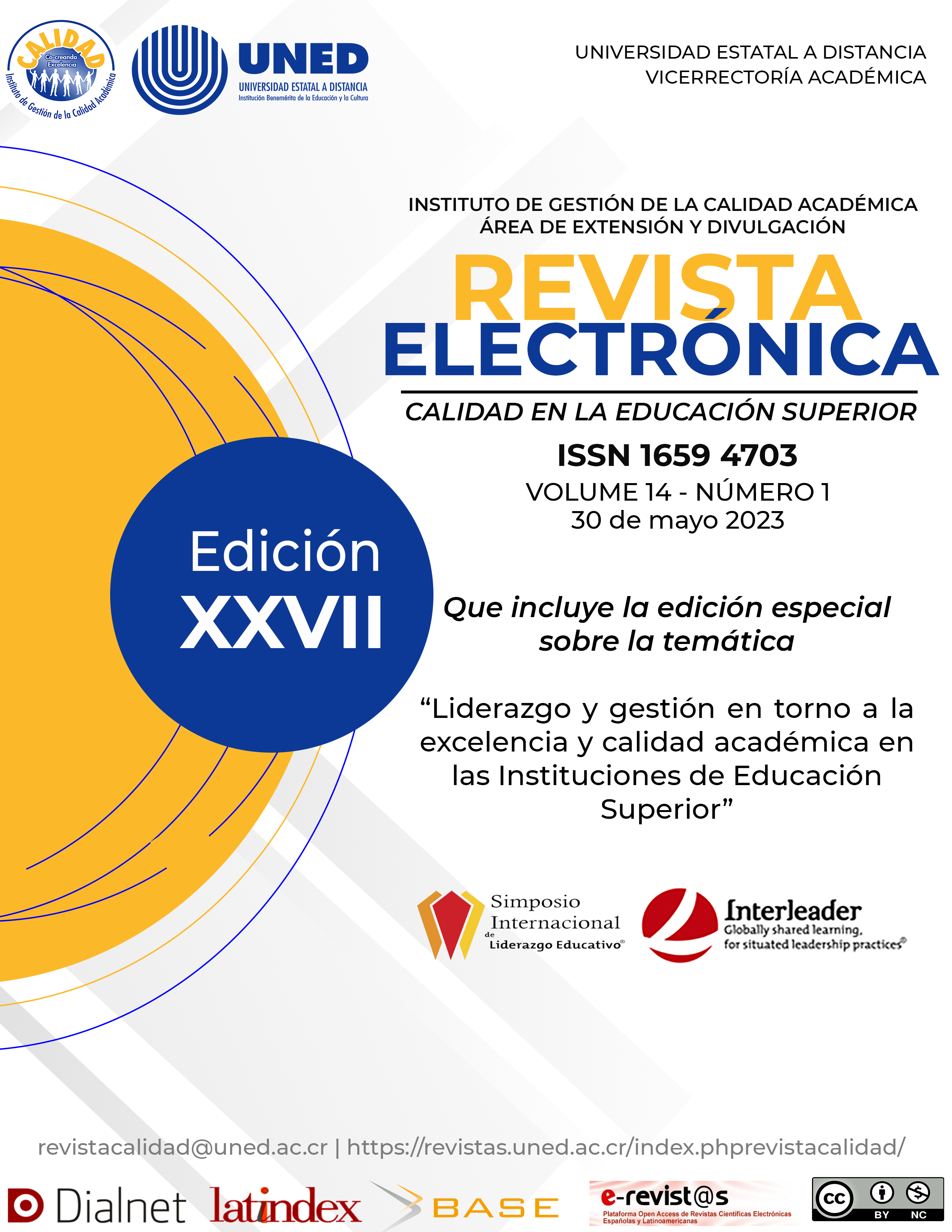Evaluación de la Estrategia de Nivelación en Física, Química y Matemática (ENFIQUIMA) en la Universidad Estatal a Distancia de Costa Rica, durante el período 2021- 2022
DOI:
https://doi.org/10.22458/caes.v14i1.4643Keywords:
academic performance, desertion, strategy, levelingAbstract
The disassociation between the secondary education academic level and the one required for university education has brought difficulties for students and produced desertion. The leveling subjects aim to strengthen the previous knowledge of students, to improve academic success and reduce desertion in the following courses. In this work, we describe the Leveling Strategy in Physics, Chemistry and Mathematics (ENFIQUIMA, for its acronym in spanish), with the purpose of evaluating it from a student’s perspective, academic performance and a FODA analysis to look for improvement areas. In this research quantitative and qualitative data were used, for a mixed, concurrent type, and an exploratory-descriptive reach. To evaluate the ENFIQUIMA, the research group used: a) a diagnosis of 286 students enrolled in Physics, Chemistry and Mathematics courses´ perceptions about the ENFIQUIMA. b) an analysis of the academic performance of 119 students that passed nivelatory courses. c) a FODA analysis of the ENFIQUIMA. It was determined that 89% (255) of the students enrolled in in Physics, Chemistry and Mathematics courses did not know nivelatory courses were available. The effectivity of the ENFIQUIMA was confirmed in the Chemistry course. The Physics and Mathematics courses could not be evaluated because of a small number of students with the criteria of an excessive number of courses following the nivelatory. Most students in the courses Physics I, Chemistry I and Mathematics are unaware of the existence of the ENFIQUIMA and most students that passed the nivelatory and also the next course consider the ENFIQUIMA benefited them. In Chemistry, the success rate in students that passed the nivelatory course was double the rate of those that didn’t. Areas of improvement for the ENFIQUIMA were identified.
References
Alí, S., Haider, Z., Munir, F., Khan, H. & Ahmed, A. (2013). Factors Contributing to the Students Academic Performance: A Case Study of Islamia University Sub-Campus. American Journal of Educational Research, 1(8), pp. 283-289. DOI:10.12691/education-1-8-3
Alvarado-Bejarano, V. & Quirós-Vargas, E. (2020). Curso Nivelatorio para aspirantes de ingreso a la carrera de Enseñanza del Inglés en la UNED. Revista Espiga, 20(41), 85-97. https://www.redalyc.org/articulo.oa?id=467865438006
Arrieta, L. & Mercado, M. (2018). Nivelatorios: estrategia para mitigar deserción académica precoz. Octava Conferencia Latinoamericana sobre el Abandono en la Educación Superior. https://core.ac.uk/download/pdf/234021041.pdf
Carmona, T. (12 de febrero, 2019). UCR prepara a estudiantes de nuevo ingreso con talleres de nivelación. https://www.ucr.ac.cr/noticias/2019/02/12/ucr-prepara-a-estudiantes-de-nuevo-ingreso-con-talleres-de-nivelacion.html
Duche, A., Paredes, F., Gutiérrez, O. & Carcausto, L. (2020). Transición secundaria-universidad y la adaptación a la vida universitaria. Revista de Ciencias Sociales (Ve), 16(3), 244-258. https://www.redalyc.org/journal/280/28063519018/html/
Fontalvo, W., Castillo, M. & Polo, S. (2014). Análisis comparativo entre las características más relevantes de deserción estudiantil en el programa de Ingeniería Industrial de la Universidad Autónoma del Caribe. Estudiantes activos en el periodo 2013-01 y desertores académicos de los periodos 2011-01 a 2012-02. Escenarios. 12(1), 96-104. file:///C:/Users/Usuario/Downloads/Dialnet-AnalisisComparativoEntreLas CaracteristicasMasRelev-4763535.pdf
Gallardo, G., Goni, F., Sanhueza, M. & Cruz, M. (2019). Transición secundaria-educación superior: Desafíos para los estudiantes, desafíos para las instituciones. Educación Inclusiva.
Gasiewski, J., Eagan, K., García, G., Hurtado, S. & Chang, M. (2012). From Gatekeeping to Engagement: A Multicontextual, Mixed Method Study of Student Academic Engagement in Introductory STEM Courses. Research in Higher education, 53, 229-261. https://doi.org/10.1007/s11162-011-9247-y
Gridchina, V. & Osipova, L. (2018). Methodical features of thew leveling course organization of mathematics for bachelors of “applied mathematics and informatics”. Tomsk State Pedagogical University Bulletin, 7, 168-173. 10.23951/1609-624X-2018-7-168-173
Hernández, L., Castano, L., Cruz, C., & Nigenda, J. (2021). Personalised learning model for academic leveling and improvement in higher education. Australasian Journal of Educational Technology, 38(2), 72-84. https://ajet.org.au/index.php/AJET/article/download/7084/1848
Hernández-Sampieri, R. & Mendoza-Torres, C (2018). Metodología de la Investigación: Las Rutas Cuantitativa, Cualitativa y Mixta. México: McGraw Hill Education.
Hernández-Chaverri, R., Montero-Miranda, E., & Villalobos-González, Wy. (2017). Evaluación del Conocimiento Básico en Química en Estudiantes de Educación Diversificada: el caso de Ingeniería Industrial, UNED. Revista Electrónica de Calidad en la Educación Superior, 8(2), 1-23. http://dx.doi.org/10.22458/caes.v8i2.1915
Hernández, R., Fernández, C. & Baptista, P. (2014). Metodología de la investigación (6.ª ed.). McGraw Hill.
Herrera-Villareal, D., Villalobos-González, W., Bermúdez-Campos, K. & Godoy-Cabrera, C. (2021). Perfil sociodemográfico de la población que estudia Enseñanza de las Ciencias Naturales en la Universidad Estatal a Distancia (UNED). Revista Electrónica de Calidad en la Educación Superior, 12(2), 216-234. DOI: http://dx.doi.org/10.22458/caes.v12i2.2728
Jiménez-Fernández, M. & Díaz-Jiménez, H. (2017). Experiencia en la implementación de las pruebas de ubicación diagnóstica y cursos nivelatorios en la carrera de Ingeniería Industrial en la UNED del año 2013 al 2015. Electrónica de Calidad en la Educación Superior, 8(2), 178-199. https://doi.org/10.22458/caes.v8i2.1870
López, M. (30 de marzo 2022). ¡Atención! UCR ofrece cursos gratuitos de nivelación de Matemática para estudiantes de primer ingreso. La República. https://www.larepublica.net/noticia/atencion-ucr-ofrece-cursos-gratuitos-de-nivelacion-de-matematica-para-estudiantes-de-primer-ingreso-2022-01-06-05-31-11
Navarro, E. (2003). El rendimiento académico: concepto, investigación y desarrollo. REICE. Revista Iberoamericana sobre Calidad, Eficacia y Cambio en Educación, 1(2). https://www.redalyc.org/articulo.oa?id=55110208
Ochoa, H.r, Aul, C., Bruton, D. & Timmons, C. (2017). A Summer Camp in Engineering Physics for Incoming Freshman to Improve Retention and Student Success. Faculty Publications, 8. https://doi.org/10.18260/1-2--27520
Programa Estado de la Nación. (2021). Octavo Estado de la Educación 2021. https://estadonacion.or.cr/wp-content/uploads/2021/09/Lanzamiento_ee.pdf
Sánchez, É.r, Raigozo, A., Fierro, L. & Cárdenas, F. (2020). La permanencia desde la experiencia del proyecto de vida en el curso nivelatorio, a partir de una mirada de la complejidad. Corporación Universitaria Minuto De Dios - UNIMINUTO – COLOMBIA. https://core.ac.uk/download/pdf/234020321.pdf
Sánchez, D. (2020). Análisis FODA O DAFO. Madrid, España: Bubok Publishing S.L.
UNESCO. (2020). COVID-19 y educación superior: De los efectos inmediatos al día después. http://www.iesalc.unesco.org/wp-content/uploads/2020/04/COVID-19-060420-ES-2.pdf
Downloads
Published
How to Cite
Issue
Section
License
Copyright (c) 2023 Revista Electrónica Calidad en la Educación Superior

This work is licensed under a Creative Commons Attribution-NonCommercial 4.0 International License.
Esta revista provee acceso libre inmediato a su contenido bajo el principio de que hacer disponible gratuitamente la investigación al publico, lo cual fomenta un mayor intercambio de conocimiento global.
